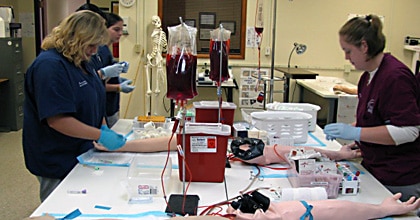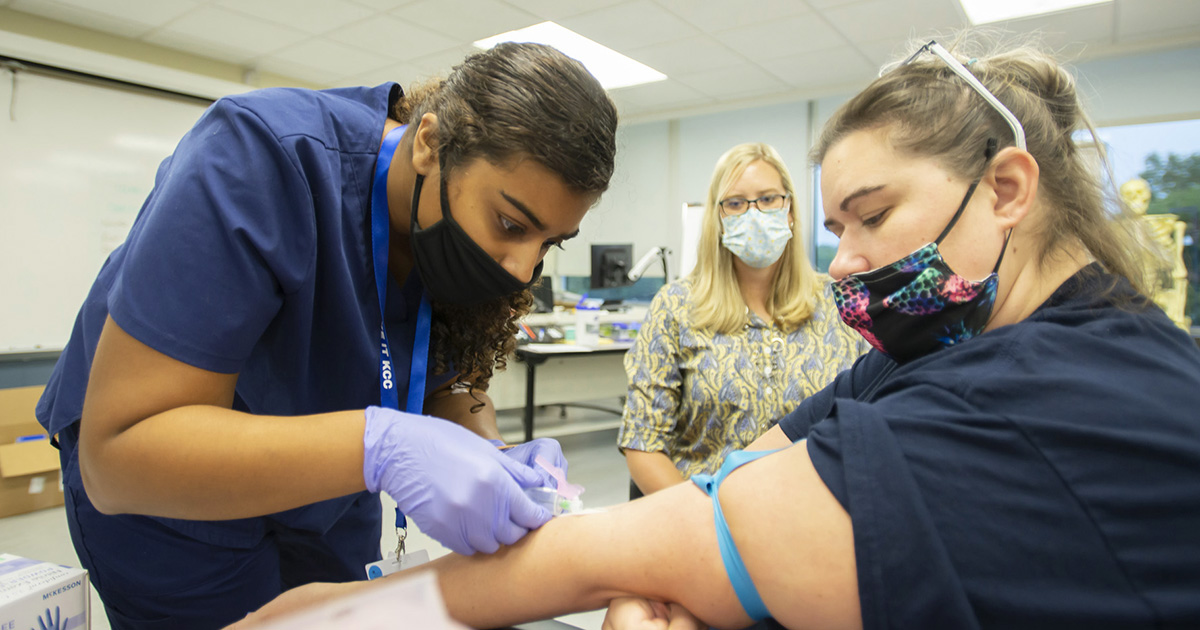Daily Routine as a Student in a Phlebotomy Training Course
Daily Routine as a Student in a Phlebotomy Training Course
Blog Article
The Course to Certification: Comprehending the Phlebotomy Educating Training Course Journey and Its Significance
As you take into consideration the course to certification in phlebotomy, it is necessary to recognize the role you'll play in healthcare. Your training will cover crucial abilities, from blood collection techniques to patient communication. Each part of the program prepares you for the obstacles ahead. But just what does the journey involve, and why is qualification so critical for your future career? Let's discover these inquiries further.

The Function of Phlebotomists in Medical Care
Phlebotomists play a necessary role in the medical care system, serving as the vital web link in between individuals and essential analysis screening. You'll carry out blood attracts, guaranteeing examples are gathered accurately and safely. Your proficiency assists in diagnosing medical problems, monitoring health and wellness, and leading treatment choices.
In your daily interactions, you'll require to develop count on with individuals, making them really feel comfortable during what may be a stressful experience. You are accountable for classifying and handling samples very carefully to protect against contamination or errors, which could impact examination outcomes.
Beyond this, you'll typically function along with doctors and nurses, communicating vital info concerning people' problems. Your role is fundamental in maintaining the workflow in medical care setups, making certain prompt and exact outcomes. By understanding your abilities, you add meaningfully to person treatment, making you an indispensable part of the clinical group. Embracing this responsibility is key to your success as a phlebotomist.
Introduction of Phlebotomy Training Programs
When checking out phlebotomy training programs, you'll find various kinds developed to fit different timetables and discovering styles. Each program aids you create necessary skills like blood collection and patient communication. Understanding these alternatives is crucial to choosing the appropriate course for your career.
Sorts Of Educating Programs
Several sorts of training programs are offered for those looking to come to be skilled in phlebotomy. You can select from certificate programs, which typically last a couple of months and concentrate on essential skills. There are additionally diploma programs that supply an even more extensive education, commonly lasting up to a year. If you're trying to find a deeper understanding, an associate level in a related field may be the best fit. On the internet courses provide adaptability for those balancing work or family members commitments, enabling you to examine at your very own pace. Furthermore, some healthcare facilities and centers supply on-the-job training programs, giving functional experience while you learn. Whatever path you select, each program aims to furnish you with the essential skills for a successful phlebotomy occupation.

Trick Skills Developed
Understanding phlebotomy requires a set of essential skills that are established with complete training programs. In addition, interaction abilities are essential; you'll require to connect with people, explain procedures, and placed them at convenience. Each of these abilities is essential for your success as a certified phlebotomist, making you a valuable asset in any type of health care setup.
Secret Parts of a Phlebotomy Course
In a phlebotomy course, you'll concentrate on essential subjects that lay the foundation for your future occupation. You'll take part in hands-on training that enables you to use what you've learned in real-world setups. Both the core educational program and functional experience are important for your success as a phlebotomist.
Curriculum Overview
While seeking a phlebotomy training course, you'll experience a curriculum designed to outfit you with essential skills and understanding. Phlebotomy Classes Near Me. This educational program usually consists of anatomy and physiology, concentrating on the blood circulation system and understanding blood parts. You'll likewise find out about various sorts of blood collection approaches, consisting of venipuncture and capillary puncture strategies
Additionally, infection control and safety procedures are crucial components, ensuring you understand exactly how to preserve a clean and sterile setting. You'll study patient interaction, emphasizing communication and empathy, which are important for reducing person anxiety.
Hands-On Training Experience
Obtaining hands-on experience is a crucial component of your phlebotomy training course. This practical training permits you to use what you've learned in a real-world setup, improving your skills and self-confidence. Phlebotomy Courses Near Me.
In addition, you'll get the chance to connect with individuals, which is vital for developing your interaction skills. This mix of technical proficiency and social skills is essential for your success as a licensed phlebotomist. Ultimately, hands-on training is where concept meets technique, solidifying your expertise and readiness for qualification.
Accreditation and Licensing Needs
Before you can begin your profession in phlebotomy, it is essential to comprehend the qualification and licensing demands that differ by state. Many states call for phlebotomists to hold an accreditation from an identified organization, such as the National Phlebotomy Courses Near Me Phlebotomy Organization or the American Society for Scientific Pathology. These qualifications usually entail passing an exam that examines your knowledge and skills in the area.
In addition to accreditation, some states have details licensing requirements. You may require to complete a specific variety of hours in clinical method, send evidence of training, or undergo a history check. It is very important to research your state's guidelines to make certain you meet all required requirements.
Remaining notified about these requirements not only aids you safeguard a position however likewise enhances your reputation as a professional. By fulfilling these needs, you'll be well on your method to a successful career in phlebotomy.
Hands-On Training and Practical Experience
Hands-on training and useful experience are vital parts of your phlebotomy education and learning, as they permit you to use academic understanding in real-world circumstances. During your training, you'll take part in supervised venipuncture, learn proper techniques, and become accustomed to various blood collection equipment. This straight participation is essential for constructing your self-confidence and developing your skills.
You'll work very closely with seasoned experts who can guide you via the subtleties of individual interaction and example handling. Each practice not only reinforces your understanding yet likewise prepares you for the hectic environment of medical care setups.
Additionally, many programs include medical rotations, permitting you to experience diverse setups, from health centers to outpatient centers. This exposure assists you adapt to various challenges and person requirements, ensuring you're well-prepared for your future function. Embrace these possibilities, as they're vital to becoming an experienced and caring phlebotomist.
Obstacles Dealt With Throughout Training
While acquiring hands-on experience is essential, it's crucial to recognize the difficulties that can arise during your phlebotomy training. You could experience anxiousness when carrying out procedures on genuine patients, particularly if you're brand-new to the environment. The pressure to obtain every little thing right can be overwhelming. Furthermore, understanding the skills required for blood draws takes technique; you might battle with method originally.
Time management can also be a hurdle, as balancing theory, useful sessions, and personal commitments can feel challenging. You may deal with varying discovering speeds among your peers, causing feelings of self-doubt if you believe you're dropping behind. Lastly, adapting to the different personalities of instructors can be challenging, as each may have an unique teaching design.
Acknowledging these obstacles at an early stage can prepare you for success and help you create strength throughout your training trip.
Profession Opportunities After Certification

As you get experience, you could also consider focusing on locations like pediatric or geriatric phlebotomy, satisfying certain client requirements. Some phlebotomists choose to progress their jobs by ending up being laboratory technicians or seeking additional education and learning in medical care fields.
Furthermore, your certification can cause functions in training or managing brand-new phlebotomists, permitting you to share your expertise. With the healthcare industry continually growing, your skills will certainly constantly remain in need, leading the way for a steady and satisfying occupation. Accept the chances waiting on you!
Frequently Asked Questions
What Is the Typical Period of a Phlebotomy Educating Training Course?
Phlebotomy training programs usually last around four to eight weeks. You'll engage in hands-on technique, class direction, and online learning. Finishing this training prepares you for qualification and a satisfying occupation in health care.
Are Online Phlebotomy Courses Available?
Yes, online phlebotomy training courses are offered. They provide flexibility and ease, permitting you to examine at your very own speed. Just validate the program is recognized to meet qualification demands and gain beneficial abilities for your career.
Just How Much Does Phlebotomy Training Usually Cost?
Phlebotomy training commonly costs in between $700 and $2,500, depending upon the program and area. You ought to consider aspects like course size, consisted of materials, and hands-on experience when picking the best training for you.
What Are Typical Requirements for Phlebotomy Training?
Usual prerequisites for phlebotomy training typically consist of a senior high school diploma or GED, booster shots, and a history check. Some programs might additionally require basic health care understanding or accreditations, ensuring you're gotten ready for hands-on training.
Can I Function While Finishing My Phlebotomy Training?
Yes, you can function while finishing your phlebotomy training. Many students balance jobs with their research studies, however make sure to handle your time successfully to assure you fulfill both job and training dedications efficiently.
Report this page